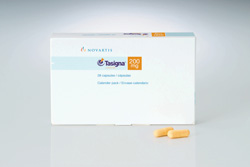 |
| Tasigna--Courtesy of Novartis |
Novartis ($NVS) is facing yet another investigation in Japan. Little more than a month after a panel of Japanese lawyers uncovered serious misconduct during a trial of its leukemia drug, Tasigna, the Japanese government is probing whether the company broke the law by failing to report side effects of the product.
Sources tell The Japan Times that the country's Health, Labor and Welfare Ministry has opened an investigation into charges that Novartis collected information on 3,000 Japanese patients who were taking the drug last year, and found 30 cases of side effects--10 of which should have been reported to the government but weren't--the paper reports, citing unnamed sources.
Two cases of side effects were also found in connection with the highly scrutinized clinical trial, which took place at the University of Tokyo Hospital. The trial compared the side effects of leukemia treatments, including Tasigna (nilotinib), which is Novartis' follow up to its blockbuster Gleevec (imatinib).
In March, hospital officials revealed that Novartis employees had been much more involved in the trial than previously suspected. For example, at least 9 Novartis sales reps collected patient questionnaires during the trial and then faxed them to the hospital, despite the fact that trial protocol requires doctors to return the questionnaires themselves. The independent panel later found that when the misconduct allegations surfaced, some Novartis employees shredded documents and deleted computer files.
Now Novartis is vowing to sign formal contracts with its trial investigators in Japan, according to an editorial in The Japan Times, calling for broad reforms in clinical trial transparency. But the paper points out that Novartis provided much-needed financial support to the University of Tokyo lab that was involved in the leukemia study: ¥8 million over three years ($1.3 million). To foster neutrality in clinical trials, "the government needs to expand its support for researchers so that they don't have to rely on money from the pharmaceutical industry," the paper contends.
Novartis has been under fire in Japan since last summer, when news erupted that employees had been involved in a now-retracted study of its blood pressure drug Diovan. Earlier this year, Japanese regulators filed a criminal complaint against Novartis under its false-advertising law, alleging that the company used misleading data to promote the drug. In April, Novartis ousted its top Japanese executives and replaced them with executives from its British, Canadian and German operations.
- here's the story from The Japan Times
- read more in The Japan Times about trial transparency